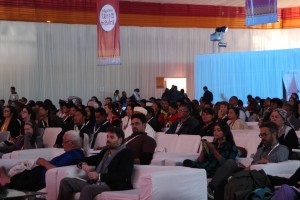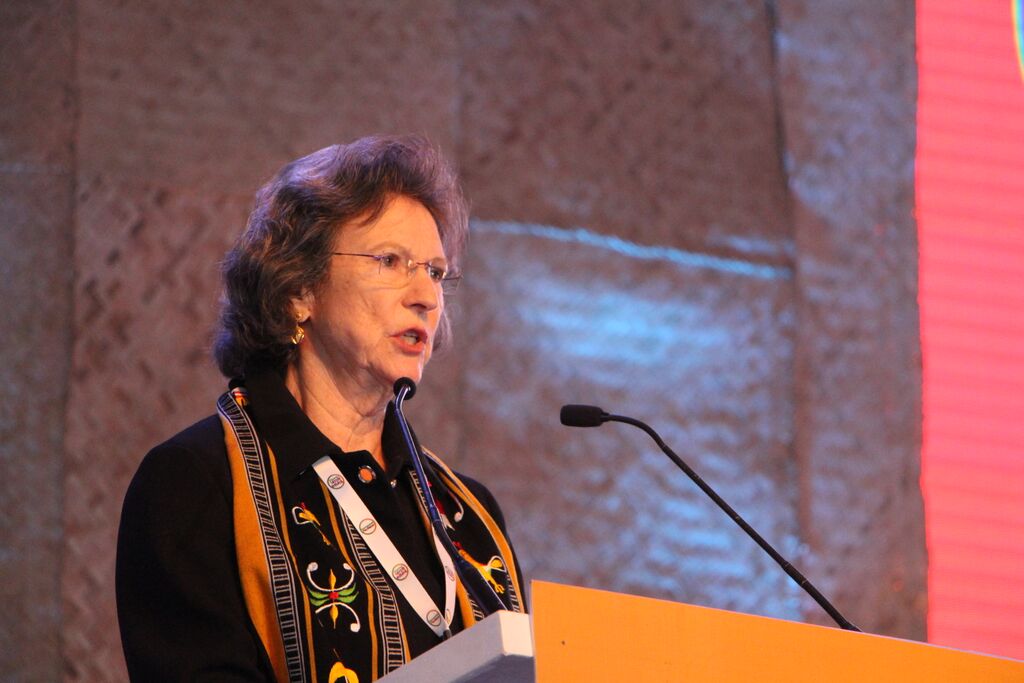The second day of the World Indigenous Conclave of the Indigenous Terra Madre 2015 continued with plenary and thematic sessions. The first plenary session of the day ‘Nutritional Security and Local Food Systems: Learning from Matriarchal Societies’, began with the Chair Dr. Peggy Sanday (University of Pennsylvania, USA) expressing her good fortune on getting to interact at this event, directly with the indigenous people gathered, rather than hearing their stories from anthropologists, as is usually the case. This session included the findings of the different studies undertaken on behalf of the indigenous people. Dr. Harriet Kuhnlein, Professor Emerita, McGill University, Canada shared the study that had collected data from the Khasi and the Chakhesang tribal in Northeast India. Dr. Juliane Friedrich (IFAD, Italy) spoke about the work done among indigenous peoples by her and Rachele Ellena (Indigenous Partnership, Italy), who was also on the panel. The next panelist Dr. Treena Delormier shared her studies on food security and sovereignty, by which she concluded “we need to relearn” by which she meant we have to look back to indigenous knowledge. The next panelist, Dr. Solot Sirsai (Mahidol University, Thailand) spoke about the study that was done in the North West part of Thailand with the Sane Phong Community, who adopt a holistic approach for food systems and nutritional security. They also performed community work which looked into food systems survey and to promote gardening. There is a diversity of local food in the community and around 387 local foods are found there. Dr. Friedrich concluded saying that peace is just not the absence of war and nutrition security is not equal to food security.
 The delegates then divided themselves into the parallel track sessions, the first of which was entitled ‘Storytelling – a Unique Documentation of Oral History and Knowledge’, chaired by Dr. Desmond Kharmawphlang (NEHU, India). The panel comprised of Rita Banerji (Green Hub, India), Edgar Hinge (Master Sand Drawer, Vanuatu), Bruce Pascoe (Writer, Australia) and Kegitar Lyngkhoi (NESFAS, India). The session was filled with the panelists recounting traditions of storytelling in their communities and the oral histories that are part of their heritage and their very being.
The delegates then divided themselves into the parallel track sessions, the first of which was entitled ‘Storytelling – a Unique Documentation of Oral History and Knowledge’, chaired by Dr. Desmond Kharmawphlang (NEHU, India). The panel comprised of Rita Banerji (Green Hub, India), Edgar Hinge (Master Sand Drawer, Vanuatu), Bruce Pascoe (Writer, Australia) and Kegitar Lyngkhoi (NESFAS, India). The session was filled with the panelists recounting traditions of storytelling in their communities and the oral histories that are part of their heritage and their very being.
The second track ‘Are Today’s Matriarchal Communities Societies of Peace?’ continued the theme of the plenary session. The session was chaired by Dr. Treena Delormier (University of Hawaii at Manoa, USA) while the keynote address was by Dr. Peggy Sanday. The panelists Dr. Solot Sirisai, Agustin Uriana (Teacher, Columbia), Aurelius Nongkynrih (NEHU, India), Maria Leon (Anthropologist/ Farmer, Mexico) and Saoudata Aboubacrine (Coordinator TIN HINAN, Burkina Faso) discussed how matriarchal communities are deeply rooted to Mother Earth and naturally tend towards peaceful solutions.
The third track session chaired by Munkhbolor Gungaa (Pastoralist, Mongolia) took up the topic of ‘Pastoralists and their Challenges’. Pastoralists from Kenya, Russia, Arunachal Pradesh and the Sami people discussed being a pastoralist being in today’s world and the struggles they face.
Simultaneously, the Honey Taste Workshop treated the audience to varied honeys brought from Nagaland, Tamil Nadu, Garo HIlls and East Khasi Hills , Meghalaya, while recounting their individual stories of beekeeping and honey collection, while explaining the origins and flavours of all the honeys.
The second plenary session of the day ‘Supporting Agroecology and Agrobiodiversity for the Future of Food’ was chaired by the Executive Director of the Swift Foundation, Jen Astone. The keynote address was by Sunita Rao from VANASTREE, India and the panelists from various international agro-biodiversity organisations shared their concerns regarding the direction in which food production, procurement and marketing is heading globally.
The first track session thereafter focussed on ‘Women’s Role in the Future of Food and Nutritional Security’. The chair Yon de Larrinoa and the Keynote speaker Dr. Daphne Miller emphasised on the importance of women in relation to their role of gathering food and feeding their families since time immemorial. The panelists, Dr. Peggy Sanday, Dr. Aurelius Kyrham Nongkynrih, Faustina Sosima Perez, Norma Rodriguez and Maria Leon shared their stories of working with indigenous women in their own communities.
The second track session concentrated on ‘Inspiring Stories of Ecological Approaches’, chaired by Kyra Busch from the Christensen Fund. The keynote address was delivered by Dhrupad Choudhury from ICIMOD, Nepal while the panel consisted of Mayumy Chiemi (Peru), Ramaswamy Selvam (Keystone Foundation, India) and Dr. Vincent Darlong (IFAD).
The third session ‘Sustainable Development Goals and the Future We Want’ was chaired by Dr. Winona La Duke (White Earth Land Recovery Project, USA). The panelists Antonella Cordone (Italy), Migdalia Pellicier (USA) and Ashish Kothari (India) spoke of their experiences of working in their respective countries keeping sustainable development goals in mind.
The fourth track ‘Creative Communication Approaches for Indigenous Issues’ was chaired by Patricia Mukhim (Editor, Shillong Times). The panelists filmmaker Rita Banerjee, media expert Shobhit Jain, Ecuador Community Radio Host Luis Lemay, Binandre tribe member Bao Waiko and NEBuzz journalist Inoto Nawang Khulu discussed the challenges of representing indigenous communities appropriately in the media.
The second taste workshop showcased Fermented Foods from different regions like Korea (Kimchi and Rice Alcohol), Thailand (Khao Mak), India (Phalap and Passion Tea from Assam) and Scandinavia (Sourdough bread and Tempeh), which was extremely well-received by the gathered audience.
The last plenary session of ITM 2015 addressed one of the most talked about issues of this century Climate Change but through the lens of indigenous voices. The session was chaired by Anneli Jonsson (Slow Food SAPMI, Sweden) while the keynote address was by Dr. Gleb Raygorodetsky (University of Victoria, Canda). The panelists Nick Lunch (InsightShare, UK), Dr. Joel Simo (Vanuatu), Jose Montengro (Mexico), Ankan De (India) and Eli Enns (Canada) shared their concerns of how climate change is affecting indigenous communities all over the world and what is the possible way forward.
Day 3 of ITM saw the conclusion of the plenary and thematic sessions for the gathered delegates. The remaining two days of the event will consist of village visits and a grand Food Festival at Mawphlang Sacred Grove on 7th November, 2015.
 Translate
Translate





